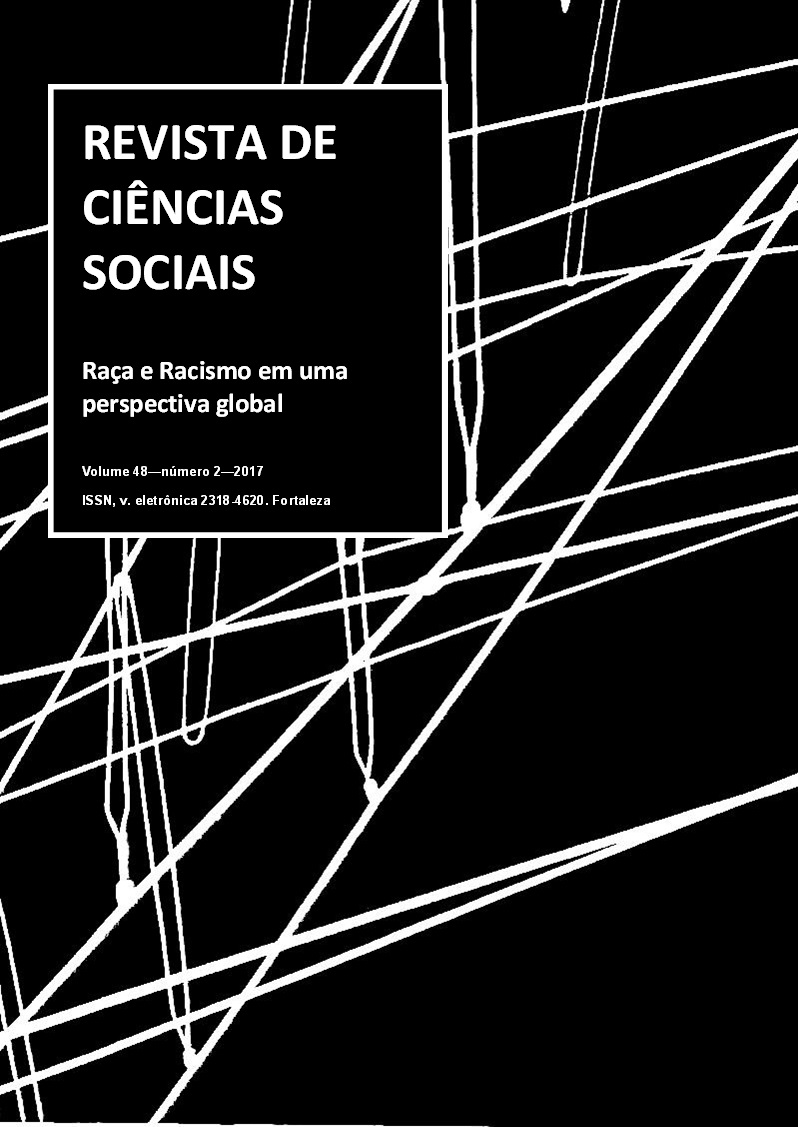For a Paradigm Shift: antiblackness and structural antagonism
Keywords:
Antiblackness, Black Diaspora, Social Death, Afterlife Of SlaveryAbstract
By proposing the utilization of the blacknonblack analytical dyad instead of the canonical analytical dyad white-nonwhite, this article argues that the grammar of antiblackness and its asymmetrical field of ositionalities are normative, subliminal, utiquitous, transhitorical, and thus effectively immune to contestation. This grammar establishes black absence as self evident. The fact that black persons share andreproduce this antiblack symbolic universe exemplarily demonstrates this universe's naturalization and omnipresence. Blackness, even for black persons, is seen as humanity's antithesis in an antiblack world. Thus, a black consciousness that is not dependent on the grammar of antiblackness is possible only when antiblackness and the cognitive and social world that it structures are destroyed.References
CHURCHILL, Ward. A Little Matter of Genocide: Holocaust
and Denial in the Americas, 1492 to the Present. San Francisco:
City of Lights, 1997.
FANON, Frantz. Black Skin, White Masks. Translated by
Charles Lam Markman. New York, NY: Grove Press, 1967.
FRENCH, Jan Hoffman. Legalizing Identities: Becoming Black
or Indian in Brazil's Northeast. Chapel Hill: University of North
Carolina Press, 2009.
GOFF, Phillip et al. "Not Yet Human: Implicit Knowledge,
Historical Dehumanization, and Contemporary Consequences."
Journal of Personality and Social Psychology 94, no. 7 (2008):
-306.
GORDON, Lewis R. Bad Faith and Antiblack Racism. Amherst,
NY: Humanity Books, 1999.
HARTMAN, Saidiya. Scenes of Subjection: Terror, Slavery, and
Self-Making in Nineteenth-Century America. New York, NY:
Oxford University Press, 1997.
JUNG, Moon-Kie. Beneath the Surface of White Supremacy:
Denaturalizing U.S. Racisms Past and Present. Stanford, CA:
Stanford University Press, 2015.
MASSEY, Douglas, and Denton, Nancy. American Apartheid:
Segregation and the Making of the Underclass. Cambridge, MA:
Harvard University Press, 1993.
MCKITTRICK, Katherine (ed.). Sylvia Wynter: On Being
Human as Praxis. Durham, NC: Duke University Press, 2015.
OMI, Michael, and Winant, Howard. Racial Formation in the
United States. Third Edition. New York, NY: Routledge, 2015.
PAIXÃO, Marcelo, Rossetto, Fabiana, Carvano, Luiz. Relatório
das Desigualdades Raciais no Brasilç 2009-2010. Rio de Janeiro,
RJ: Garamond Universitária, 2010.
WAISELFIZS, Julio J. Mapa da Violência 2012: A Cor dos
Homicídios no Brasil. CEBELA, FLACSO, Brasília: SEPPIR,
, 41.
WILDERSON, Frank B. Red, White, and Black: Cinema and the
Structure of U.S. Antagonism. Durham, NC: Duke University
Press, 2010.
Downloads
Published
How to Cite
Issue
Section
License
Autores que publicam nesta revista concordam com os seguintes termos:- Autores mantém os direitos autorais e concedem à revista o direito de primeira publicação, com o trabalho simultaneamente licenciado sob a Creative Commons Attribution License, que permite o compartilhamento do trabalho com reconhecimento da autoria do trabalho e publicação inicial nesta revista.
- Autores têm autorização para assumir contratos adicionais separadamente, para distribuição não-exclusiva da versão do trabalho publicada nesta revista (ex.: publicar em repositório institucional ou como capítulo de livro), com reconhecimento de autoria e publicação inicial nesta revista.
- Autores têm permissão e são estimulados a publicar e distribuir seu trabalho online (ex.: em repositórios institucionais ou na sua página pessoal) a qualquer ponto antes ou durante o processo editorial, já que isso pode gerar alterações produtivas, bem como aumentar o impacto e a citação do trabalho publicado (Veja O Efeito do Acesso Livre).



